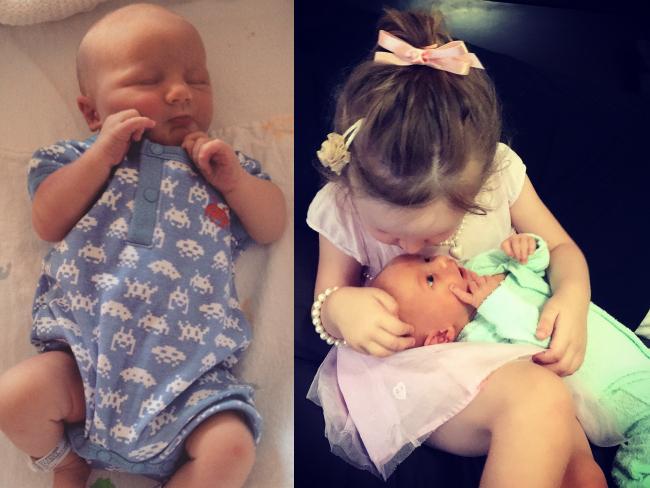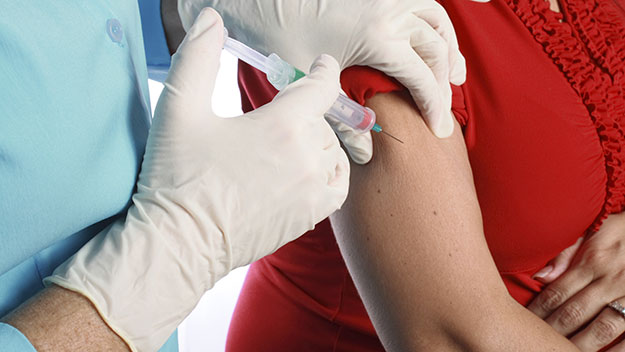My son, Riley John Hughes was born a healthy and strong baby on February 13th, 2015.
Nobody was more excited than his three-year-old sister, Olivia, who had asked me nearly every day during my pregnancy if he was “ready yet”. I’ll never forget when they first met – his blue eyes locked onto hers and she couldn’t stop giggling with happiness. We felt our little family was complete.
The first few weeks were a blur of breastfeeding, nappy changes and cuddles. Friends and family dropped by with gifts and meals, helping us adjust to life with two children. We went for walks at the park and to the nearby river, where Olivia could run around while Riley and I relaxed in the shade. We were so happy.
When Riley was three-weeks-old, he developed a little sniffle. Several days later, he started to occasionally cough, so I called a doctor to visit. The doctor reassured me that Riley was fine. I thought at the time that I was probably just being an anxious parent.
That evening, I had a wonderful, restful sleep – and that’s when I realised something wasn’t right.
I woke-up with a start early the next morning, suddenly aware that Riley hadn’t woken for a feed. This was very unusual for a baby who liked to breastfeed every second hour! Feeling quite concerned, we took Riley into our local Children’s Hospital where he was admitted. I thought we’d be discharged the next morning.
The next day, Riley’s doctor listened to his cough and looked worried. She told me it sounded like whooping cough (known medically as ‘Pertussis’), so they sent a swab test off for analysis and began treatment.
I felt relieved that we had a diagnosis and that treatment was being administered, however I was soon told that the antibiotic treatment for whooping cough wouldn’t “cure” Riley or even reduce his symptoms – it just reduces infectivity to other people.
We watched as Riley rapidly grew worse and worse. His coughing became severe, and he required oxygen.
Three days into his hospital stay, he developed severe pneumonia and was taken into the paediatric intensive care unit.
Riley had raging fevers while toxins from the whooping cough bacteria flooded his tiny body.
He was placed on life support to give his tired body a rest, and was attached to an ECMO machine to give his heart and lungs a chance to rest and get better. Watching all the wires and tubes invade his little body was horrifying, and we broke down in tears often.
On the fourth night of Riley’s hospital stay I left to get some much-needed rest at my parents’ house, ten minutes away from the hospital. I crawled into bed next to my daughter, and sobbed.
Three hours later, I awoke with an urgent phone call. “You have to come in now – he’s not in a good way” my husband, Greg told me.
Terrified, I rushed back to the hospital, where we had a small baptism ceremony in the early hours of that morning. I picked up his little hand and his fingers still wrapped around my index finger. I thought there was still hope.
Riley hung on for a few more hours, but later that afternoon his heart started failing. We cradled him in our arms and sung him a lullaby as he faded away in front of our eyes.
Riley was just 32-days-old, and we left the hospital with empty arms and broken hearts.
After Riley’s death, we vowed to do whatever we could to protect any other baby from the same fate. We shared his story, and two days later the state governments began announcing the introduction of free whooping cough booster shots during the third trimester of pregnancy – something that was never offered to me.
We have up a Light for Riley Facebook page in his honour and have raised over $60,000 for whooping cough research.
We have travelled to Pregnancy & Baby expos around the country, educating families about how to protect themselves from this insidious disease, and have had meetings in Federal Parliament, where we have discussed different strategies for improving immunisation.
It is recommended by the Australian government that all pregnant women in their third trimester of each pregnancy receive the whooping cough vaccine. Their antibodies transfer to their unborn baby through the placenta, protecting them from whooping cough bacteria when they are born.
It is also recommended that any adults who expects to come into contact with babies less than six-months-old should also receive the whooping cough vaccine. This includes fathers, grandparents and friends. By getting the vaccine at least two weeks before beginning close contact with a baby the chance of passing on the whooping cough bacteria to the baby is greatly reduced.
Riley may have lost his fight with whooping cough, but we will keep fighting for him.
His death has devastated our family, and we will do everything we can to prevent this happening to another baby or family.
Written by Catherine Hughes, mother-of-two and passionate immunisation advocate.
For more information about Riley and regular information about immunisation and preventing whooping cough follow Light for Riley on Facebook.


